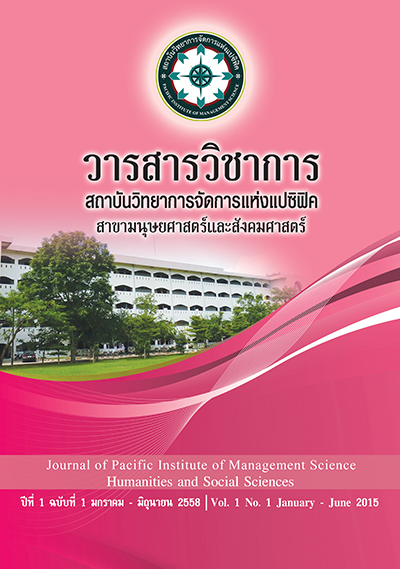The management which affects work efficiency of the Special Case officers and Special Case inquiry officers in the Department of Special Investigation (DSI)
Keywords:
Entrepreneurship, motivation, facilityAbstract
The study of the management which affects work efficiency of DSI Officers, DSI has 3 objectives: 1. To study main work efficiency of DSI officers, 2. To study factors which affect the development of work efficiency of DSI officers, 3. To study guidelines to develop work efficiency of DSI officers. The result of the research is: The results of quantitative information analysis are as below: Section 1 the ratio of male/female who responded is pretty close, age between 46-50 years old, then people younger than 40 years old. The majority has Bachelor’s degree and average income less than 30,000/month. The second group has average income 50,001-70,000/month most of them work as DSI officers rather than investigation officer, and most of them has work experience between 4-6 years, and 1-3 years. Section 2. The level of knowing the management in DSI to develop work efficiency of DSI officers is high, and knowing of budget management, administration and personnel are high. Section 3. The level of opinion towards work efficiency of DSI officers in general is high, for example in giving ultimate good service, in professional expertise, adhering to rightness/fairness and working in team. Section 4. Individual factors affect the main work efficiency of DSI officers. It is found that the difference of gender, age give direct effect to the main work efficiency of DSI officers. Education, average monthly income, work level and work experience has effects to DSI officers. The analysis of the management in developing work efficiency of DSI officers shows the strategy set up, administration, personnel and budget has the relation with work efficiency of DSI officers at the level 0.01 = 0.387 budget + 0.369 administration + 0.214 Personnel. The result of information analysis shows that the management has been planned well in terms of budgeting to support strategy of developing main work efficiency of DSI officers. The management has achieved the goal and has set the proper strategies : 1. Policy and strategy to achieve concrete results, 2. Developing vision and leadership for high level executives, 3. Personnel Management, 4. Organization developing for Human Resources, 5. Setting up learning centre, 6. Providing modern equipment, 7. Budgeting to support projects .
References
กรมเมืองและการปกครองจังหวัดลพบุรี.
จำเรียง วัยวัฒน์ และเบญจมาศ อำพันธ์.(2540). วินัย 5 ประการพื้นฐานองค์กรเรียนรู้. กรุงเทพฯ : คู่แข่ง.
จินตนา บุญบงการและณัฎฐพันธ์ เขจรนันท์. (2548). การจัดการเชิงกลยุทธ์. กรุงเทพฯ : ซีเอ็ด ยูเคชั่น.
จุฑาธวัช อินทรสุขศรี. (2551). การพัฒนาทรัพยากรมนุษย์กับความสามารถในการแข่งขันยุค โลกำภิวัตน์.[ออนไลน์].
บทความมหาวิทยาลัยธรรมศาสตร์. [สืบค้น 2 ธันวาคม 2556]. แหล่งที่มา https://kc.hri.tu.ac.th/index.php.
ฉลาด อยู่ยืน.(2552). ทัศนคติต่อประสิทธิผลของโครงการพัฒนาศักยภาพและสมรรถนะของทรัพยากรมนุษย์กรม
ศุลกากรตามยุทธศำสตร์ 5 ปี (พ.ศ.2551-พ.ศ.2555). ปริญญาปรัชญาดุษฎีบัณฑิต สาขาการบริหารการพัฒนา
ทรัพยากรมนุษย์ มหาวิทยาลัยปทุมธานี.
ชวนพิศ สิทธิ์ธาดา.(2552). รูปแบบสมรรถนะของผู้บริหารสถานศึกษาขั้นพื้นฐานที่มีประสิทธิผล. สาขาวิชาบริหารการ
ศึกษา ภาควิชาบริหารการศึกษา บัณฑิตวิทยาลัย มหาวิทยาลัยศิลปากร.
ชวินท์ ธัมมนันท์กุล. (2541). Learning Organization (Workshop): สำหรับฝ่ำยสนับสนุนการ เรียนรู้ธนาคารไทย
พาณิชย์ จำกัด (มหาชน). กรุงเทพฯ : อินเทลลิเจนซ์แอนด์ครีเอทิวิตี้.
ชาครติ สนัทราย. (2552). การพัฒนาสมรรถนะหลักการเป็นผู้นำเชิงกลยทุธข์องผู้จัดการสำขำธนำคำรพำณชิย์ในจังหวัด
เชียงใหม่. ปริญญาปรัชญาการจัดการดุษฎีบัณฑิต สาขาการจัดการธุรกิจ บัณฑิตวิทยาลัย มหาวิทยาลัยราชภัฏ
สวนดุสิต.
ชาญเชาว์ ไชยานุกิจ. (2545). กรมสอบสวนคดีพิเศษ:เอฟบีไอตำรับไทย:ประชาชนได้อะไร?. บทความในจดหมายข่าว
สถาบันกฎหมายอาญา ปีที่ 5 ฉบับที่ 2 เมษายน-มิถุนายน.
อนันต์ พันนึก. (2554). การวิจัยและพัฒนาโปรแกรมพัฒนาสมรรถนะผู้บริหารสถานศึกษาขั้นพื้นฐาน, วิทยานิพนธ์
ปริญญาปรัชญาดุษฎีบัณฑิต สาขาวิชาการบริหารการศึกษา บัณฑิตวิทยาลัย มหาวิทยาลัยขอนแก่น.
อังศินันท์ อินทรกำแหง และ ทัศนา ทองภักดี. (2549). การพัฒนารูปแบบสมรรถนะด้านผู้นำทางวิชาการของอาจารย์
ในมหาวิทยาลัยของรัฐ เอกชน และในกำกับของรัฐ, งานวิจัยทุนสนับสนุนจาก สถาบันวิจัยพฤติกรรมศาสตร์
มหาวิทยาลัยศรีนครินทรวิโรฒ.
อำานาจ วัดจินดา. (2549). เทคโนโลยีกำรบริหาร: เครื่องมือเพื่อการพัฒนาองค์กร. วารสาร ดำรงราชานุภาพ, ปีที่ 6, ฉบับที่ 18.
Anonymous, H.K.(1997). Human Resource Management. Core competencies.
Blancero, Donna ; Boroski, John, and Dyer, Lee,Key Competencies for a Transformed Human Resource
Organization: Results of a Field Study. Human Resource Management no.35 (July, 1996): 383-403.
Boam, R. and Sparrow, P.(1992). Designing and achieving Competency. McGraw-Hill, Reading.
Boselie, J.P.and Paauwe, J.(2005). Human Resource Function Competencies in Europeanmultinational
Companies, Personnel Review. Farnborough.
Downloads
Published
Issue
Section
License
บทความที่ได้รับการตีพิมพ์เป็นลิขสิทธิ์ของ สถาบันวิทยาการจัดการแห่งแปซิฟิค
ข้อความที่ปรากฏในบทความแต่ละเรื่องในวารสารวิชาการเล่มนี้เป็นความคิดเห็นส่วนตัวของผู้เขียนแต่ละท่านไม่เกี่ยวข้องกับสถาบันวิทยาการจัดการแห่งแปซิฟิค และคณาจารย์ท่านอื่นๆในสถาบันฯ แต่อย่างใด ความรับผิดชอบองค์ประกอบทั้งหมดของบทความแต่ละเรื่องเป็นของผู้เขียนแต่ละท่าน หากมีความผิดพลาดใดๆ ผู้เขียนแต่ละท่านจะรับผิดชอบบทความของตนเองแต่ผู้เดียว







